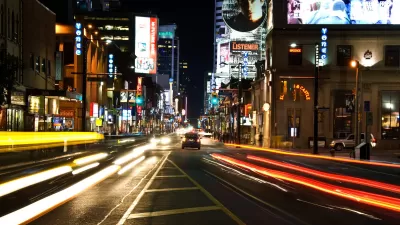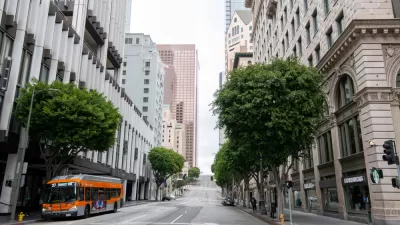The consequences of car-centric planning are clear, a century after cars took over streets and lives across this country. According to this article, so to is a new way forward.

Richard Kingston and Ransford A. Acheampong write on the subject of reversing the course of the past century of car-centric planning around the world. The consequences of this epoch-defining priority on the automobile make the need for change clear, according to the article:
It is estimated that there are more than a billion cars in the world. As well as driving up energy use, contributing to more than 70 per cent of C0₂ emissions in the transport sector and reducing air quality, cars are also responsible for increasing obesity and chronic illnesses and killing more than 1.25m people around the globe every year in traffic accidents.
Kingston and Acheampong offer three prescriptions, already implemented to varying degrees, to those outcomes: 1) car-free zones and charges, 2) public transit investments, and 3) improved urban planning and land use. More details on each of these three prescriptions are offered in the source article.
FULL STORY: We can reclaim cities from the car without inconveniencing people

Planetizen Federal Action Tracker
A weekly monitor of how Trump’s orders and actions are impacting planners and planning in America.

San Francisco's School District Spent $105M To Build Affordable Housing for Teachers — And That's Just the Beginning
SFUSD joins a growing list of school districts using their land holdings to address housing affordability challenges faced by their own employees.

Can We Please Give Communities the Design They Deserve?
Often an afterthought, graphic design impacts everything from how we navigate a city to how we feel about it. One designer argues: the people deserve better.

The EV “Charging Divide” Plaguing Rural America
With “the deck stacked” against rural areas, will the great electric American road trip ever be a reality?

Judge Halts Brooklyn Bike Lane Removal
Lawyers must prove the city was not acting “arbitrarily, capriciously, and illegally” in ordering the hasty removal.

Engineers Gave America's Roads an Almost Failing Grade — Why Aren't We Fixing Them?
With over a trillion dollars spent on roads that are still falling apart, advocates propose a new “fix it first” framework.
Urban Design for Planners 1: Software Tools
This six-course series explores essential urban design concepts using open source software and equips planners with the tools they need to participate fully in the urban design process.
Planning for Universal Design
Learn the tools for implementing Universal Design in planning regulations.
Borough of Carlisle
Smith Gee Studio
City of Camden Redevelopment Agency
City of Astoria
Transportation Research & Education Center (TREC) at Portland State University
City of Camden Redevelopment Agency
Municipality of Princeton (NJ)





























